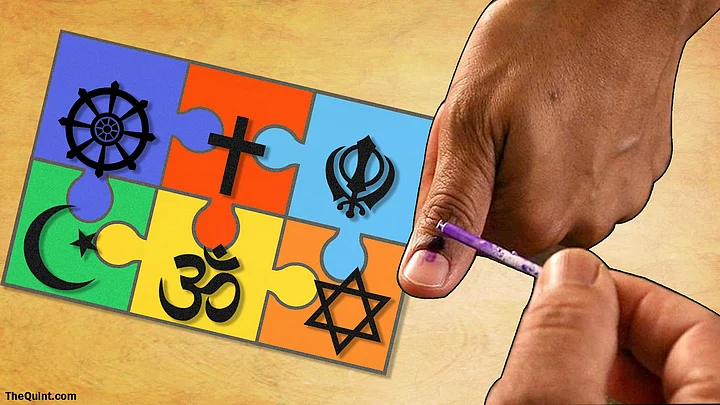On 15 December, a BSP corporator in Aligarh, Musharraf Husain, was beaten up and booked by the police for allegedly taking oath in Urdu. The complainant, BJP corporator Pushpendra Kumar feared that Husain’s action would lead to “a possibility of breakdown of law and order,” reports The Hindu. In Madhya Pradesh, 30 priests were detained and their car burnt when they were singing carols, on the allegation by a group of Bajrang Dal members that the priests were indulging in forced conversion.
In 2017, with a spate of mob lynchings making headlines, and politics of polarisation taking centrestage, it is time to ask whether India — it’s judiciary and political institutions — is doing enough to safeguard the rights of minorities in the country?
On Minorities Rights Day in India, The Quint takes a look at the year gone by, though a selection of reportage and opinion on minorities’ issues in India.
1. We The Minority: India's Muslims Speak Out in the Time of ‘Gau Raksha’
How does an average Muslim in India react to everyday reports of cow-related violence in India? How has increased intolerance affected inter-community ties, social relations, mindsets, even business practices among India’s Muslims?
In this multimedia immersive, The Quint spoke to Indian Muslims in cities across India to gauge how everyday life is increasingly being disrupted by the shadow of fear. Here’s an excerpt:
“A change in people’s attitudes, an atmosphere of fear, increasing intolerance and wariness of hate-mongering - most Muslims confess that after a spate of mob lynching incidents, there’s a sense of being under constant threat. For some, the harshest impact of mob lynching in everyday lives is the transformation in the mindsets of non-Muslims; reflected best in ‘gau-raksha’ politics.”
2. Ambedkar’s Army: A Dalit Force Fights Caste Atrocities in Uttar Pradesh
In Uttar Pradesh’s Saharanpur, a group of social activists called ‘Bhim Army’ are defying authority, fighting caste discrimination, mobilising people, and changing the face of Dalit politics in the state. In this multimedia immersive, The Quint investigates the origins of Bhim Army through their leader, Chandrashekar’s story, and asks whether caste-based politics can find a place in contemporary India.
3. Liaquat-Nehru Pact: When India, Pak Promised to Protect Minorities
The first step to safeguard the rights of minorities in India was taken shortly after the Partition in 1950, when the Indian and Pakistani Prime Ministers Jawaharlal Nehru and Liaquat Ali Khan signed the Delhi or the Liaquat-Nehru Pact. This video illustrates the political and social challenges to signing of the historical pact, and its legacy in both India and Pakistan.
4. Alwar to Rajsamund: Majority Tells Minority ‘We Can’t Protect You’
The killing of Afrazul Khan in Rajasthan’s Rajasmand district has sparked anger across the country, with the graphic video of the man’s killing in the name of religion reigniting the debate on minority rights in India. In this opinion piece, Chandan Nandy reflects on Rajasthan becoming India’s ‘lynchistan’.
5. Ballabhgarh Lynching: Lack of Political Will Failed the Minorities
Lynching of Mohammad Akhlaq in Dadri, UttarPradesh in 2015 was a turning point in India’s politics, but could a simple law have prevented it? In his opinion piece published in The Quint, Hilal Ahmed argues that a bill on communal violence, which was dropped in 2014, could have prevented Akhlaq’s killing and prevented the spate of mob lynchings in India.
6. Modi Government Cannot be Deaf to the Concerns of Minorities
In his assessment of three years of Modi government, Ashutosh, AAP spokesperson argues that the BJP government has been unable to assure minorities of their security in a growing cultural atmosphere of fear. Here’s an excerpt:
Far from creating sweeping reforms, the BJP has instead fostered a cultural atmosphere that is radically at odds with our tradition of secularism and tolerance. Nehru’s democratic ideals and institutions are under attack in Modi’s India, Gandhi’s legacy lies in tatters. While it is true that Modi’s reputation as a Hindu neta preceded his taking over as the PM, it was his promise of economic development for all (Sabka Saath, Sabka Vikas) that brought him to power. Three years later, that narrative has gone off-track completely.
7. Jamia’s Minority Status: Politics Blurs Muslim Marginalisation
Analysing the history of the conflict over Jamia Millia Islamia University’s status as a ‘minority’ institution, Hilal Ahmed argues in an opinion piece published in The Quint over how this debate sidelines the plight of excluded groups such as poor Muslims, Dalit Muslims and Muslim women. Here’s an excerpt:
“As expected, the debate on the minority status of Jamia operates in a nationalism versus secularism binary. There are a few self-declared nationalists, who evoke unity and integrity of the nation (all Indians are one!) to oppose the privileges given to minorities (read: Muslims). The minority status of Jamia, thus, is described as an appeasement of minorities, which these commentators fear will encourage separatism and even terrorism! A section of orthodox secularists (especially the Congress politicians), on the contrary, offer us an equally powerful defence. They argue that the secular parties are guardians of minority rights. The minority status of Jamia, they suggest, symbolises the democratic values of the Nehruvian idea of ‘unity in diversity’.”
8. Perhaps Rahul Should Visit Mosques and Churches as Well
As a part f his campaign for the Gujarat elections, Congress president Rahul Gandhi visited a slew of temples in the state, including the famous Somnath temple. Commenting on this phenomenon, with a historical context on how Congress has always perceived to be indulging in minority appeasement, Amulya Ganguli argues in an opinion piece that it is essential that Gandhi also ‘demonstrate devotion’ to all religions.
(Breathe In, Breathe Out: Are you finding it tough to breathe polluted air? Join hands with FIT in partnership with #MyRightToBreathe to find a solution to pollution. Send in your suggestions to fit@thequint.com or WhatsApp @ +919999008335)
(At The Quint, we question everything. Play an active role in shaping our journalism by becoming a member today.)
